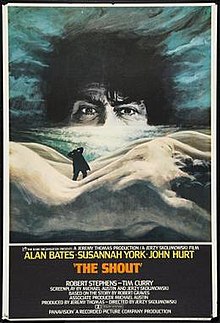This article needs additional citations for verification. (June 2018) |
The Shout is a 1978 British horror film directed by Jerzy Skolimowski. It was based on a short story by Robert Graves and adapted for the screen by Skolimowski and Michael Austin. The film was the first to be produced by Jeremy Thomas under his Recorded Picture Company banner.
| The Shout | |
|---|---|
 Theatrical release poster | |
| Directed by | Jerzy Skolimowski |
| Screenplay by | Jerzy Skolimowski Michael Austin |
| Story by | Robert Graves |
| Produced by | Jeremy Thomas |
| Starring | Alan Bates John Hurt Susannah York Robert Stephens Tim Curry |
| Cinematography | Mike Molloy |
| Edited by | Barrie Vince |
| Music by | Tony Banks |
Production company | |
| Distributed by | Rank Film Distributors |
Release date |
|
Running time | 86 minutes |
| Country | United Kingdom |
| Language | English |
| Box office | £176,806-500,000[1][2] |
Plot
editCrossley (Alan Bates), a mysterious travelling man invades the lives of a young couple, Rachel and Anthony Fielding (Susannah York and John Hurt). Anthony is a composer, who experiments with sound effects and various electronic sources in his secluded Devon studio. The couple provides hospitality to Crossley but his intentions are gradually revealed as more sinister. He claims he has learned from an Aboriginal shaman how to produce a "terror shout" that can kill anyone who hears it unprotected.
Cast
edit- Alan Bates as Crossley
- Susannah York as Rachel Fielding
- John Hurt as Anthony Fielding
- Robert Stephens as Chief Medical Officer
- Tim Curry as Robert Graves
- Julian Hough as Vicar
- Carol Drinkwater as Wife
- Susan Wooldridge as Harriet
- Jim Broadbent as Fielder in cowpat
Production
editBackground
editProducer Jeremy Thomas had initially wanted to get Nicolas Roeg to direct the film but Roeg turned down the offer due to being unavailable.[2] Eventually Thomas hired Jerzy Skolimowski due to Skolimowski's fluency in English as well as having been impressed with his prior work on Deep End.[2]
Filming
editInteriors were shot at Pinewood Studios, the film's sets were designed by the art director Simon Holland. The North Devon coastline, specifically Saunton Sands and Braunton Burrows, was used for the bulk of the location shooting. The church of St Peter in Westleigh was used for the church scenes. The producer, Jeremy Thomas, later remembered his experience making the film,
Because I had a great director, and a quality piece of literature, I managed to get a wonderful cast such as John Hurt and Alan Bates. Skolimowski had a sense of shooting style then, this was the second director who I had worked closely with, and it was fascinating watching Skolimowski work. He came from a Polish tradition, the Wajda Film School, he had a different background to other directors I had been working with in the cutting rooms or elsewhere. And it made the film much more creative to me. I saw it more as an artistic endeavour by him. The film went to Cannes and won the Grand Prix de Jury. We were incredibly lucky and the film was appreciated by the jury. It was a very small festival then, nothing like the Cannes Film Festival of today, it was a small event in a cinema of 800 people or so.[3]
Music
editThe soundtrack is by Michael Rutherford and Tony Banks of the rock band Genesis.[4] The central theme "From the Undertow" features on Banks's album A Curious Feeling.[5]
Reception
editAccolades
editThe film was nominated for the Palme d'Or at the 1978 Cannes Film Festival and received the Grand Prize of the Jury,[6] in a tie with Bye Bye Monkey.
References
edit- ^ Chapman, J. (2022). The Money Behind the Screen: A History of British Film Finance, 1945-1985. Edinburgh University Press p 357. Income is distributor's receipts, combined domestic and international, as at 31 Dec 1978.
- ^ a b c Childs, Mike; Jones, Alan (1978). "The Shout". Cinefantastique. Fourth Castle Micromedia. Retrieved 4 February 2024.
- ^ Thomas, Jeremy; Lieberson, Sanford (11 April 2006). ""At the Cutting Edge" – Producer Jeremy Thomas, interviewed by producer Sandy Lieberson". Berlinale Talent Campus. Archived from the original on 24 May 2010. Retrieved 3 April 2010.
- ^ "The Shout (1978)". BFI. Archived from the original on 19 April 2016. Retrieved 31 May 2021.
- ^ A Curious Feeling - Tony Banks | Songs, Reviews, Credits | AllMusic, retrieved 31 May 2021
- ^ "Festival de Cannes: The Shout". festival-cannes.com. Retrieved 24 October 2024.
External links
edit- The Shout at IMDb
- The Shout at AllMovie
- The Shout at the TCM Movie Database
- The Shout at Rotten Tomatoes